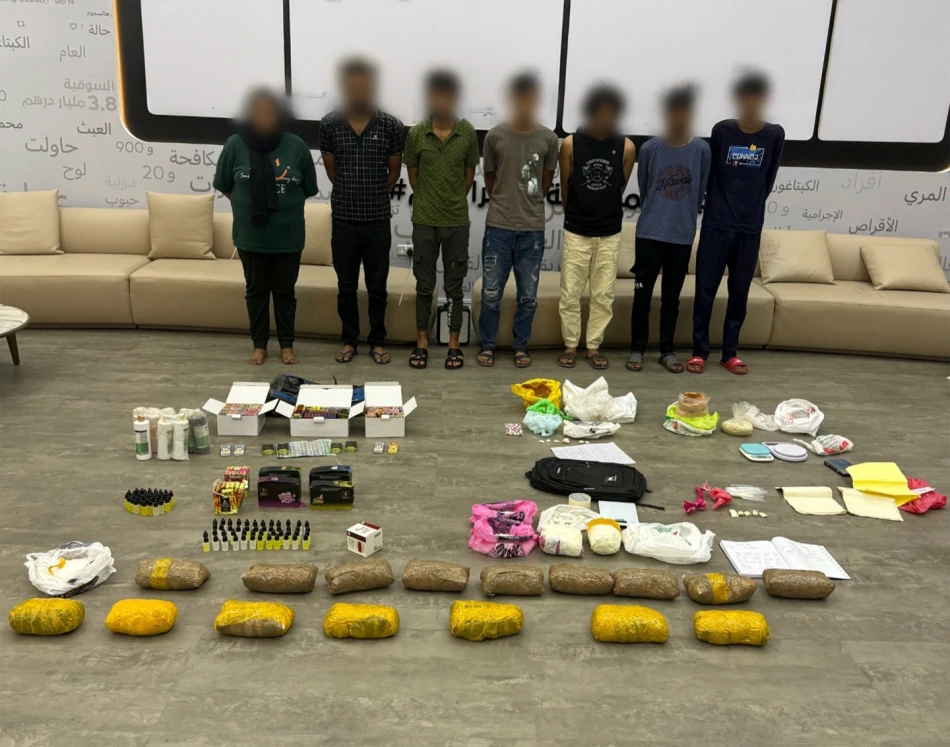
Dubai Police Bust International Drug Trafficking Ring, Arrest Leader Operating from Abroad
Dubai Police Bust International Drug Ring Using Geographic Distribution Strategy
Dubai Police have dismantled a sophisticated international drug trafficking network that used a novel geographic distribution method to evade detection. The operation netted seven Asian nationals and seized 26 kilograms of various narcotics plus nearly 28,000 Tramadol pills, revealing how modern drug cartels adapt their tactics to outsmart law enforcement surveillance.
The Geographic Shell Game
The criminal network, directed by an overseas drug dealer, employed a strategic approach that mirrors tactics seen in major trafficking hubs worldwide. Instead of centralizing their operations, the gang scattered drugs across multiple locations throughout Dubai, with each site containing approximately one kilogram of narcotics.
This distribution method serves two purposes: it minimizes losses if one location gets discovered, and it makes surveillance significantly more challenging for authorities. Similar tactics have been observed in drug operations across major cities from Singapore to Miami, where traffickers use the urban landscape as a massive storage and distribution network.
How the Operation Unfolded
Brigadier Khalid bin Muwaiza, Director of Dubai Police's Anti-Narcotics Department, explained that the bust required extensive surveillance and coordination. The investigation began with monitoring the suspects' movements and communications patterns.
Police first raided the primary suspect's residence, where they found crystal meth. This initial discovery revealed the broader network structure, showing how the local cell received instructions from an international handler who coordinated the placement and pickup of drug caches.
The subsequent ambush operation captured the remaining six suspects, including both those responsible for placing drugs at designated locations and others who came to collect the hidden supplies.
What This Means for Regional Security
The bust highlights Dubai's position as both a target and transit point for international drug trafficking. The UAE's strategic location between major production areas in Asia and consumer markets in Europe and Africa makes it an attractive route for smugglers.
For law enforcement agencies across the region, this case demonstrates how traditional surveillance methods must evolve. The geographic distribution strategy requires authorities to monitor multiple locations simultaneously while tracking digital communications that coordinate these operations.
The Technology Factor
Brigadier bin Muwaiza emphasized that the successful operation relied on Dubai Police's advanced technological capabilities, including artificial intelligence systems that can process multiple data streams and identify patterns across different locations.
This tech-forward approach reflects broader trends in law enforcement, where agencies must match the sophistication of criminal networks that increasingly use encrypted communications and complex logistics to avoid detection.
The Seized Evidence
The 26 kilograms of confiscated drugs included crystal meth, hashish, heroin, and marijuana, along with 27,913 Tramadol pills. This variety suggests the network catered to different market segments, from recreational users to those seeking prescription drugs.
The scale of the operation indicates this wasn't a small-time local network but rather a significant supply chain designed to serve Dubai's broader market. Such quantities typically represent weeks or months of street-level distribution.
Looking Forward
This bust represents more than just another drug seizure. It shows how criminal networks adapt to law enforcement tactics and how authorities must continuously evolve their methods in response.
The geographic distribution strategy will likely spread to other criminal organizations, making cases like this valuable for understanding emerging trafficking patterns. For Dubai, maintaining its reputation as a safe business hub requires staying ahead of these evolving criminal tactics.
Dubai Police continue to encourage public reporting through their emergency number 901 or the "Police Eye" service on their smart app, recognizing that community involvement remains crucial in identifying suspicious activities across the city's diverse neighborhoods.
Most Viewed News

 Sara Khaled
Sara Khaled






